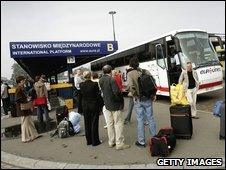UK sees shift in migration trend
- Published

Many Polish migrants to the UK have returned home
More European migrants, from countries including Poland and the Czech Republic, are leaving the UK than arriving, Home Office figures show.
It marks a reversal in movement for the first time since large-scale immigration in Europe began.
In all, there were 45,000 arrivals of A8 nationals in 2009, compared with 57,000 departures.
A8, or accession eight, refers to the central and eastern European countries that acceded to the EU in 2004.
They comprise Estonia, Latvia, Lithuania, Poland, Czech Republic, Slovakia, Hungary and Slovenia.
Overall, the UK's net migration figure - the number of immigrants minus numbers emigrating - for the 12 months ending in September 2009 was 142,000, down from 160,000 for the same period the previous year.
The data comes from the International Passenger Survey of long-term international migration, considered a broad guide to migration movements.
However, it does not take into account adjustments for asylum seekers, people who stay longer or less than intended, and migration to and from Northern Ireland.
Immigration cap
The figures also show the number of people granted British citizenship last year is at its highest level since 2005.
In 2009, 203,790 people were given citizenship, up 59% from 129,375 the previous year.
There was also a 40% increase in the numbers given grants of settlement in the UK and a 45% rise in those allowed to settle for employment reasons.
Other figures from the Home Office showed that nearly a third of foreigners wanting to make Britain their home had failed to pass their citizenship test.
The 45-minute test on British society, history and culture is a crucial step on the road to being allowed to settle permanently or full citizenship.
The new government has committed itself to introducing a cap on non-EU immigration, although the level has yet to be set.
Immigration minister Damian Green said the figures illustrated the scale of the immigration challenge facing the new government.
"I believe that immigration has been far too high in recent years which is why we will reduce net migration back down to the levels of the 1990s - to tens of thousands rather than hundreds of thousands," he said.
New measures including a limit on work permits, actions on marriage and an effective system of regulating students who come to the UK would be introduced, he added.